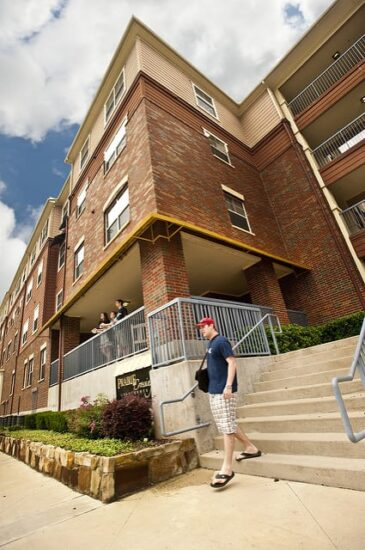Perspectives on the Honors College Experience at A&M-Commerce

The Texas A&M University System recently decided to offer Prairie Crossing, the living and learning community home of the Honors College, for potential sale. This move has created considerable dialog among current and past members of the Honors College community. In response to what he has heard, Trent Sahinkaya, 2018 Honors College graduate, had this to say:
My gut reaction was that as long as they keep the students in the Honors College together and part of that community, it would be okay to sell the building. Living and learning as a community of scholars draws people to the program. I just want the university to keep everyone together.
The Honors College at A&M-Commerce was established in 2007 by President Keith McFarland as a learning community for those young people whose ambitions for the future inspire them for an energetic and spirited encounter with learning. The community McFarland envisioned more than a decade ago remains strong, successfully lifting the financial burden from students and their families, freeing them to exploit to the fullest, for personal and communal growth, their college experience. In fact, the university seeks to expand, not contract, this unique experience in East Texas. According to A&M-Commerce President Ray Keck:
Our Honors College creates a learning community for those young people whose ambitions for the future inspire them for an energetic and spirited encounter with learning. The Honors College recruits young people whose talents and energy mark them for success. Natural gifts, to be sure, are important, and captured in an academic record and test scores. But perhaps more important is a determination to learn and to grow, to lead one's self and one's community forward.
Vice President for Business and Administration Alicia Currin and Dean of Students Dr. Thomas Newsom share in Keck's commitment to the Honors College McFarland created and Green continues to expand and enhance. Currin sees the possible sale of Prairie Crossing as a potential opportunity to further transform the Honors College experience without sacrificing the close-knit scholarly community that has always been the cornerstone of the program:
We in higher education administration are constantly being challenged to become more responsive, effective, and efficient. To address this challenge, the university continually looks for ways to improve and streamline all of our functions, including our facilities. Any change involving the Honors College must be strategic, intentional, and focused on delivering the greatest possible value for our students.
Newsom seconds Currin's commitment to continuous improvement in this area, stating:
The university is continuously assessing our current residential facilities in order to determine if they are utilized to achieve this holistic approach to student success. One of the strongest components of our philosophy of living learning communities is the Honors College and our Regents Scholars programs. Any decisions about residence life on our campus would include the commitment that support and improvement of the student learning experience is paramount.
The Honors College's Dean since its inception, Dr. Raymond Green, remains focused on expanding and improving this signature student living and learning experience at A&M-Commerce, stating:
Overseeing an Honors College is an exhilarating experience as the dynamic nature of the students pushes the program to constantly move forward. My vision for the Honors College is to channel the students' passion in the direction of greater visibility in the state and nation. My goal is to see more of our students publish the excellent work that they do in their Honors Theses. Further, I hope to see our students apply for and receive prestigious fellowships like the Fulbright or Marshall.


